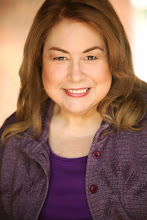The Grand Old Man of Paramount Comes to the WGA For David Milch's Talk

It was great to meet up and chat with A.C. LYLES again at the Writers Guild Foundation's Spring Storytellers, featuring DAVID MILCH this time. The event was really about David Milch, but because AC is involved in the production of Deadwood with him, he came to support him.
I first met AC in 1991 when I worked at Paramount as a page. If he was out on the lot, he was always happy to talk to your tour groups. He would always say, ask me about any star of Paramount and I'll tell you a story. And he could, with charm and grace. He knows almost everyone. The walls of his office are covered with photographs of him with every president and him with every famous actor/actress who ever worked on the Paramount lot.
I think he's been with Paramount almost from the start of its existence, having started as an usher at the Paramount theater in New York. He was assistant to the founder of Paramount Studios, Adolph Zukor. During the '60's and '70's, he produced a lot of Westerns. In fact, when I went to the Gene Autrey museum, I saw many one sheets from Westerns hanging there with his name on. During the time I worked at Paramount, first as a page and then on the network series, Viper, he seemed to be Paramount's liaison with the White House and with Hollywood in general. He was the one the White House turned to if a particular movie was being requested or if help was needed to get celebrities to events.
With his expertise, it seems logical that when Paramount decided to launch a modern-day Western in Deadwood, he'd be aboard as consultant. Through the years, I've always enjoyed the opportunities to talk with him -- he's always interesting and gracious.
The evening, however, was about David Milch and what this brilliant writer could teach us. I wasn't able to hear all of his panel as I was actually working the event. First I was a greeter and then when we found out that the company catering the post party didn't have enough people to serve as waiters, I helped out by circulating with trays of finger food. Crystal of all trades, that's me!
The thing that stands out most for me is that David Milch is not intimidated by the studios and their demands like so many of us have been at one time or the other. Perhaps this is from his hard past surviving more than one addiction or perhaps, it's because brilliant writing allows a writer a latitude that few others get. But he talked about being given limitations in time to deliver, in length of scripts, in content. But it seems like the only master he's willing to serve is the integrity of the script -- that he gives it whatever time, length, and content it needs to breathe and live. Regardless of whether it comes in on time or under budget. And ultimately, at HBO, it's about how good the product is.
David also talked about his writing process -- that when he isn't writing, he is not thinking about the script or the characters or any neat dialogue. This was particularly surprising because one always thinks that other writers act similarly to yourself. For me, the characters become living entities who take up residence in the house with me so that I'm always thinking of them somewhere. If 'they' tell me a funny bit of dialogue, I try to write it down as soon as I can. So my mind is always working somewhere on whatever problems I've encountered, or adding smart lines of banter into my characters' relationship.
David, however, said that he doesn't do it because it is never usable stuff. That he gets when he sits down to write. And he starts on page 1 and he keeps going until he writes the end.
What was also interesting was that HBO had, within the last week or so, canceled Deadwood. Oh, they still had episodes to show, but they weren't going to make any new ones. Surprisingly, there were no questions asked or comments made on that topic. No one in the audience asked him, and he certainly didn't offer it up.
He did talk about the language used on his show. The easy-to-believe stuff is all the swearing -- that's almost a given. It's the almost Shakespearean dialogue that attracts people's attention. David admits that he doesn't know if they talked like that back then, but he points out that people were far more literate back then, that they had to be to read and understand the bible. That many men of the era who came west were also men of letters to a great extent.
David also told us he had a new series green-lit for HBO, John of Cincinnati. He didn't really tell us what it was about -- maybe because he didn't think he could do it justice in words. In any case, we'll just have to watch the series when it's broadcasted to figure out what it's about.
All in all, it was a very informative evening. Ever since I watched the entire first season on DVD, I've had a comment I wanted to share with him about Deadwood... Having forgotten it at the time, I guess I'll have to drop him a note.


0 Comments:
Post a Comment
<< Home